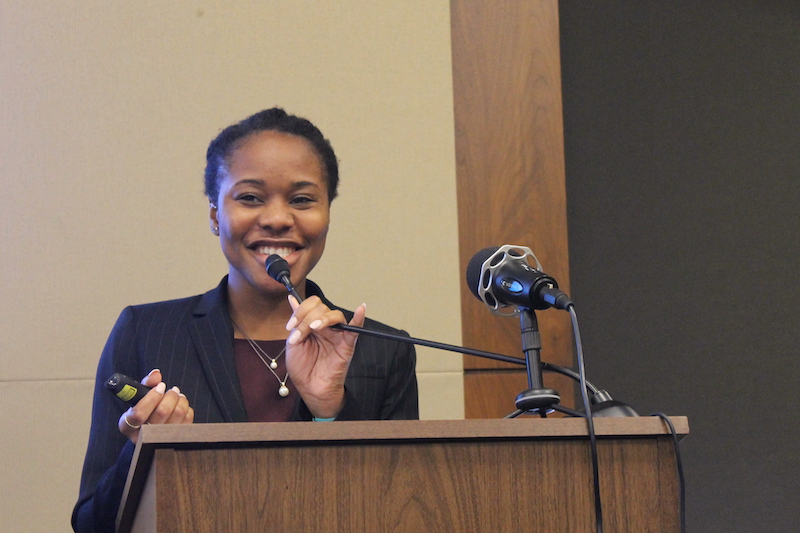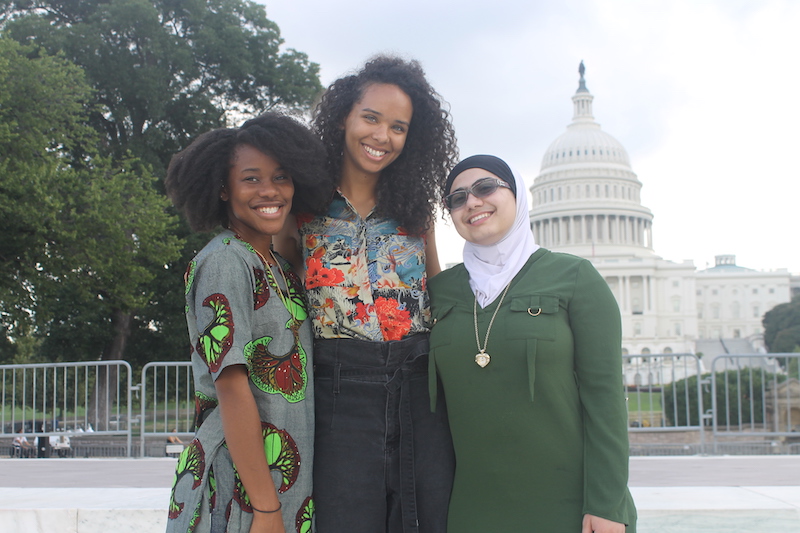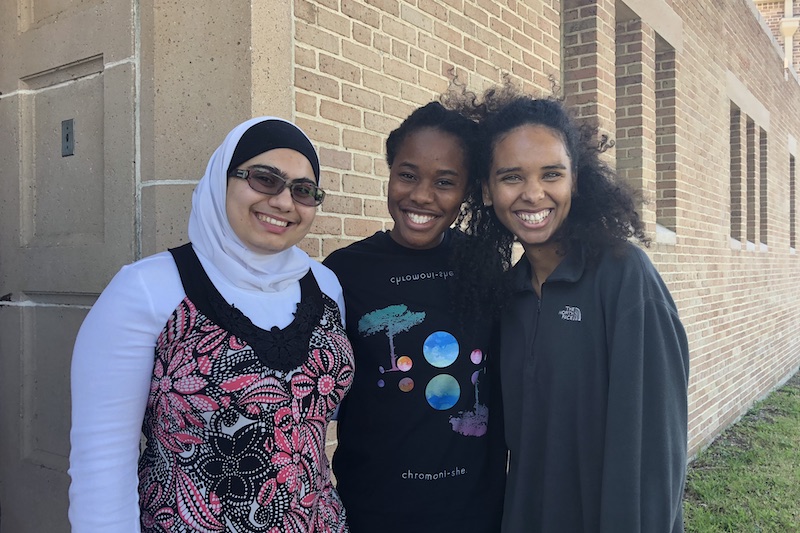From September 2018 to February 2019, Emerson Hunger Fellows Jade Adia Harvey, Malak Kudaimi, and Baridilo Dube were placed in Seattle, Washington. Read on to hear how they worked with local organizations United Way of King County, Northwest Harvest and the University District Food Bank to strengthen the local food system and amplify the voices of people receiving public assistance as advocates against hunger.
Jada Adia Harvey
Seattle is a city of disparities: sharp skyscrapers against the breathtaking Puget Sound landscape; endless summers with 9pm sunsets tempered by dark, rainy winters; flannel coats and Dr. Martens boots pair with crisp businesswear. During my time in Seattle, I’ve learned to embrace many of these quirks and contrasts, though through my work at the United Way of King County, I have noticed one disparity that is not so easy to take in: that is, the troubling of economic and opportunity gap among between the city’s wealthy and low-income residents.
In all honesty, I was surprised to receive notification that my anti-poverty fellowship field placement would take place in Seattle. Like many people nationwide, my imagination of Seattle was built around the notion that the city is as utopically prosperous as it is liberal and hip. In some ways, I got part of this right—Seattle does have a relatively low overall poverty rate and the downtown most resembles, if anything, a scene from an award-winning indie film. But what I didn’t see before moving here is the full picture of who is excluded from the dominant pop culture ideation of the city. While there is considerable wealth in the area due to the concentration of technology and manufacturing industries such as Microsoft, Amazon, and Boeing, the ever-increasing high cost of living keeps many families from ever escaping the cycle of poverty. Despite its reputation as a tech boomtown, there are clear and concentrated pockets of poverty throughout the city; Seattle, for example, has the highest concentration of college students living below the poverty line when compared to cities of similar size. My work here at the United Way of King County has challenged my own prior assumptions about Seattle as a “Pacific Northwest Paradise” to think critically about how certain demographics of residents—particularly low-income college students—struggle in stark contrast to the image of wealth and progress for which the region has now become famous.
Education can provide a pathway out of poverty, but poverty presents barriers to college access, persistence, and completion. Community and technical colleges provide an affordable, accessible way to build job skills, but many struggle to help low-income working students earn a certificate or degree. Despite local community colleges’ huge advancements in recent years, less than 50% of students nationwide achieve completion. According to United Way publications, 71% of the students who dropout of community college reportedly do so in order to make money. Without resources to tap into when income drops or expenses rise, students are left with few options for making ends meet. This is where my work at United Way’s Benefits Hub comes in.
Over the past several months, I’ve worked with the Benefits Hub team to research, design, and develop a pilot program to provide a savings and credit building opportunity for low-income students. National research shows that nearly 75% of students are not sure they could come up with $1,000 within the next month if an unexpected need arose (this includes asking friends, family, or using credit cards). This is evident locally at King County community and technical colleges, where students often need to access emergency grants during the school year to overcome unexpected emergencies. Acknowledging the limited availability of such grants, the new matched savings and credit building intervention will help students build a strong foundation to weather future financial shocks. By providing financial coaching, community, matching dollars, and a safe credit building product, the program will empower students to confidently prepare for unexpected life costs, so that financial emergencies do not get in the way of academic success.
The path to completion for low-income students is by no means easy; basic needs insecurity in the form of hunger and homelessness are leading issues. As of 2018, 9% of Seattle/King County students were homeless and nearly one in three students experience food insecurity. Costly emergencies such as a sudden health issue, a loss of childcare support, or even an issue with one’s car transmission could be destabilizing for a student. When push comes to shove and financially unstable individuals are forced to make difficult choices, education—a significant financial and time investment of its own—often must fall by the wayside. Due to these (among many) factors, according to the U.S. Department of Education, students from high-income families who enter college are now six timesmore likely than students from low-income families to graduate. This disparity is unacceptable. To me, helping low-income students meet their basic needs and prepare for financial emergencies so that they can complete their education is a critical social justice intervention to combat the rampant inequality that exists in our country today.
Learning how to intentionally-design a targeted anti-poverty program that brings together both schools, financial institutions, and nonprofits has been both invigorating and challenging. For example, in King County, approximately one third of community college students are employed while going to school and 23% are parents. Students of color represent 44% of all students attending local community and technical colleges.A priority of this project has been finding ways to reduce barriers in my own design and establish channels to overcome pre-existing barriers within our partnered educational and financial institutions to make sure that this opportunity will be accessible to those facing multiple barriers to success.
I’ve also learned the urgency with which our nation must pay greater attention to the needs of college students. The ironic thing is—though I attended a four-year university that offered a host of privileges that many community colleges unfortunately do not have—I understood some of the struggles that these students face firsthand, though I did not fully recognize it as so. I myself was a low-income college student who received Pell and S.E.O.G grants and struggled to balance school with multiple jobs. And yet, until this fellowship, I’ve never questioned the assumption that struggling to stay afloat amidst financial emergencies and food insecurity in college was anything but “normal.” Poverty and financial instability do not, and should not, have to be a rite of passage for low-income individuals seeking an education. As scholar Sara Goldrick-Rab wrote, “Paying tuition allows students to go to class, but they will fail if they have no books, no pencils, no gas money to get to school and no food in their stomachs.” It has been a powerful experience to channel my own experiences and incorporate the voices of resilient low-income students in King County to design a program built on students’ self-identified needs to get them to graduation.
Benefits Hub is pushing the needle on combating basic needs insecurity and financial instability among college students. I’ve been appreciative to join a team boldly leveraging the resources and wealth in King County to advance innovative anti-poverty solutions. I hope that Benefits Hub’s work today will translate into scalable models of intervention that can be used as a basis for widespread policy change tomorrow. It is time to look beyond the postcard-ready images of growing cities and channel resources towards ending poverty and promoting equitable opportunities for all.
Malak Kudaimi
Before coming to Seattle for my field placement, I had only a vague impression of the city. All I knew was that it supposedly rained a lot, and that it was where the characters of Grey’s Anatomy lived out their angst- and drama-filled lives. While the city was rainier than I was used to (being from Southern California) and, disappointingly, Grey’s Anatomy was filmed in L.A., I greatly enjoyed my time here and will be sad to leave. The sparkle of the sun hitting Lake Washington and the deep emerald of the trees provided a sense of peace, while the project I worked on to tackle college student hunger provided a sense of fulfillment.
Seattle, like many cities in the U.S., is currently undergoing gentrification, a process that is affecting communities of color and widening wealth inequality. Gentrification increases the cost of living in a community, which makes accessing food difficult for those experiencing poverty or those who have jobs with stagnant wages. The organization I was placed with, the University District Food Bank, has felt the effects of this process: they’ve noticed the amount of people accessing their services increasing, and recently moved to an expanded space to keep up with operations. This process has also affected many college students attending school in the University District area. My project was aimed at helping the UDFB explore partnerships with the two college campuses in their service area to address the reality of college hunger.
The University of Washington – Seattle campus and the North Seattle Community College campus both sit within the Northeast Seattle region, and the partnership between UDFB and each campus looks different. For the North Seattle campus, the food bank is currently running a weekly pop-up distribution pantry and is holding conversations with campus admin about the sustainability of this project. For the University of Washington, the food bank has provided technical assistance to the newly expanded Husky Pantry, while also formulating a larger project to connect pantry users to public benefits. Through conversations with anti-hunger advocates, I learned that expanding SNAP eligibility for college students could have a significant impact on this issue across the state.
I have enjoyed working on my project immensely. I’ve learned that responses to hunger take time, and change can be slow, and that sometimes the answer isn’t always right in front of you—you have to trust the process to get to the answer. Part of creating an effective anti-hunger response is learning to work with the community to help best meet their needs and trusting that communities experiencing hunger have insights about how to find solutions. I’ve learned that being a leader means having the humility to learn from those who are experts in their field while also trusting my instincts and past work experiences on the best path to take. The best part was figuring out how all the pieces of the project came together like a giant puzzle. I also enjoyed the process of building relationships and having conversations with campus admin, community members, pantry users, activists, and non-profit partners to work towards a common goal.
As I leave this city, I hope that the conversations that were started here continue to evolve. I hope that the pantry on the North Seattle campus becomes sustainable and campus-owned moving forward, that the students at UW become connected to public benefits, and that the public, private, and non-profit sectors can work together to end hunger for college students across Washington state. I’m grateful that I’ve been given an opportunity to make an impact in this city, and that the city welcomed me with open arms and an open heart. When I visit in the future, I’m excited to hear about the evolution of the partnerships we built here and how the conversations took off in a way I would’ve never anticipated.

Baridilo Dube presents her findings from her field work along with her fellow Hunger Fellows at Rayburn House Office Building, February 2019. Watch video of their presentations.
Baridilo Dube
Moving to Seattle has been a major adventure! There are a lot of major differences for this Houstonian, but one common thread is the presence of large refugee communities. Here the immigrant population demographic makeup is slightly different than I’m used to, but the immigrant cultures are thriving in both cities. I had the privilege of living in a neighborhood in Seattle that reflected that diversity and it was one of the best parts of my experience. In my placement at Northwest Harvest, a statewide food distributor, I have been able to work on a project that seeks to get more diverse voices heard in the realm of fighting food insecurity in Washington state and across the nation.
At Northwest Harvest we aimed to center the voices of people with lived experience with hunger and poverty in our advocacy and policy development. There were many channels through which we worked to make this happen. I assisted in the development of a leadership program that gathered a cohort of people with lived experience with hunger and poverty to grow their advocacy skills and knowledge and government and policy. I also helped with the planning of an event that hopes to gather citizens, direct service providers, and policy makers together to address issues in certain counties in Washington state. Through these projects I’ve learned that is crucial to involve those you serve in decision-making processes. I have learned that it can take a tremendous amount of time and intentionality to enact honest, respectful, and effective opportunities for engagement and feedback, but the result is always invaluable. In light of the burgeoning dedication to amplifying the voices and experiences of those who have and are living through poverty, I have found a community of people dedicated to and capable of creating a more equitable Seattle and Washington state. Nothing illustrates this better than my last week in Seattle.
It would be a major stretch of the imagination for anyone to call this city girl outdoorsy, but Seattle and the surrounding areas are undeniably beautiful, and the temperatures are very moderate. However, in my last week in Seattle there was a tremendous amount of snow and ice causing schools and business to shut down for several days. Unfortunately, this led to the cancelation of Hunger Action Day, a day of advocacy and education focusing on hunger in the states capitol). Despite this we were able to rally a small virtual version for those able to log on and learn about important hunger related bills. It was difficult that an event that we had been planning for several months had to be canceled at the last minute, but how we responded speaks to the commitment of my coworkers and the anti-hunger community. We had to adapt quickly and stay dedicated to finding ways for people to get involved and be heard. Ultimately, the online rally was well attended and very successful.
As I think over my entire time in Seattle, there were many times where I had to learn to be flexible and push forward in various ways. As I take all my field related learning to D.C., I am reminded of the wealth of knowledge there is held by those who work on the frontlines and those who experience hunger and poverty in their lives. It is also amazing seeing that many direct service organizations are growing in ways that can help address the growing number of individuals experiencing these issues and not focus on short term solutions alone.
I have never worked with a food bank or lived in the Pacific northwest before and I was in for a lot of learning about not just the city but of the emergency food system. It was information overload in the best way. I have learned so much about myself, about hunger and poverty, and so much more. I look forward to applying this new knowledge to my work in D.C. and learning new things in the next half of the fellowship.
![]() The Congressional Hunger Center gratefully acknowledges the support of the Kroger Co. Foundation which made this placement possible.
The Congressional Hunger Center gratefully acknowledges the support of the Kroger Co. Foundation which made this placement possible.



